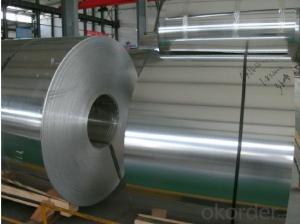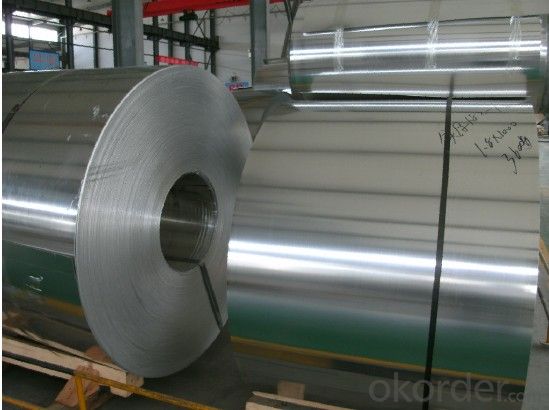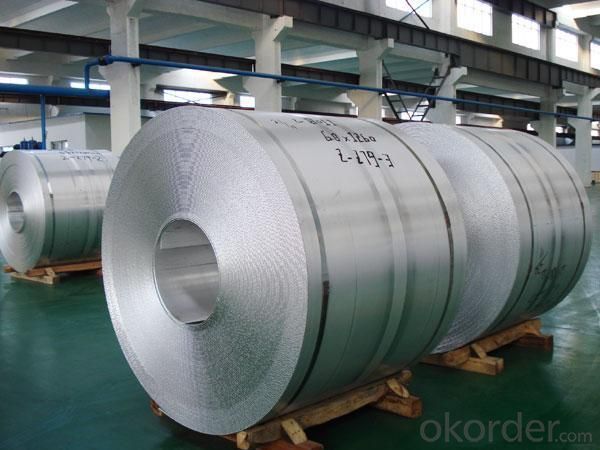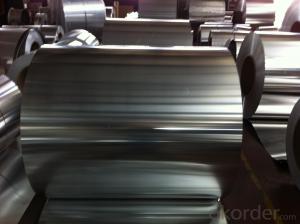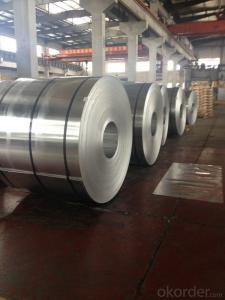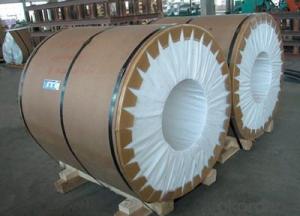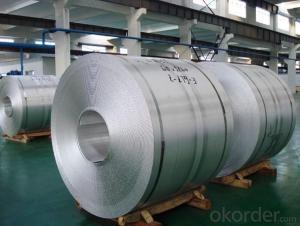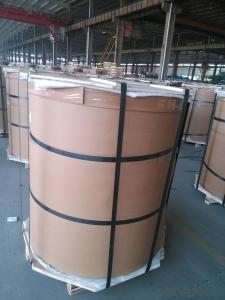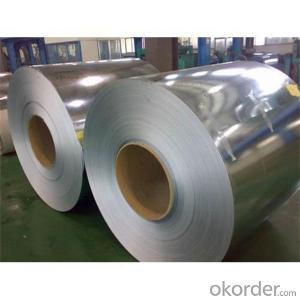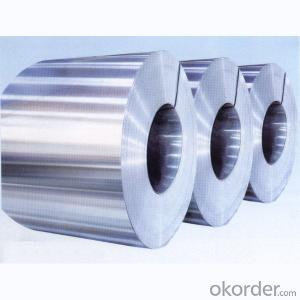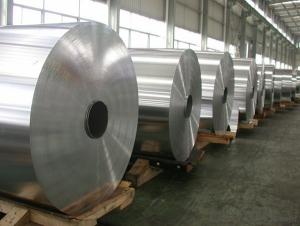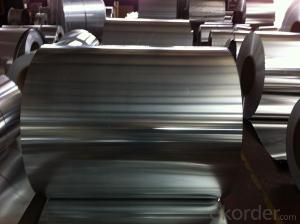Roll of Aluminum Coil - C.C AA1060 Aluminum Coils for Building Material
- Loading Port:
- Shanghai
- Payment Terms:
- TT OR LC
- Min Order Qty:
- 3 m.t.
- Supply Capability:
- 10000 m.t./month
OKorder Service Pledge
OKorder Financial Service
You Might Also Like
Specification
1.Structure of C.C AA1060 Aluminum Coils used as Building Material Description
C.C AA1060 Aluminum Coils used as Buiding Material widly used in decoration field. For the painting, it depends on the using evironment. If you use in the open air, we recommend the PVDF coated aluminium coils. This kind of painting can last 15-20 years. If you use in the room, we recommend PE coated aluminium coils. The price is much more competitive.
Direct Continuous Aluminium Foil Stock in Coil is one semi-finished aluminium material. This strip can be rolled down to aluminium foil.The final thickess can be 5-20 microns. Aluminium foil is soft, ductile and with a silver-white luster which can be widely used in a large scare of fields.
2.Main Features of C.C AA1060 Aluminum Coils used as Building Material
a.Competitive price---We have our own mills and can produce mill finished aluminium coils, so we can control the production cost better.
b.Professional after-sale service---We have more than 15 years exportation experience and you need not worry about the exporation problems.
c.Fast delivery time---We can control the delivery time within 35 days.
3.C.C AA1060 Aluminum Coils used as Building Material Images
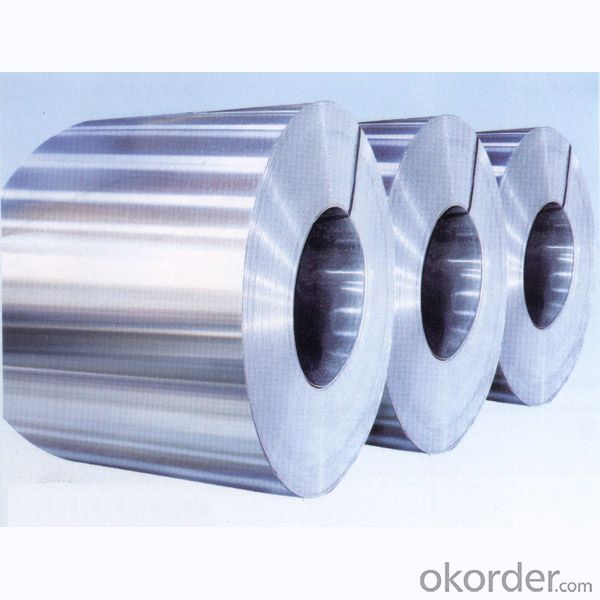
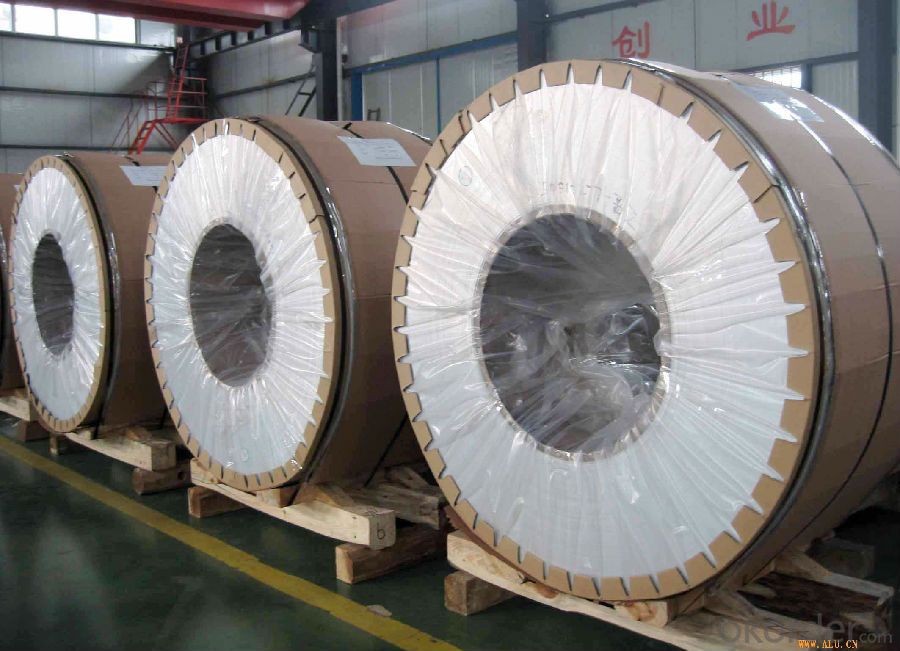
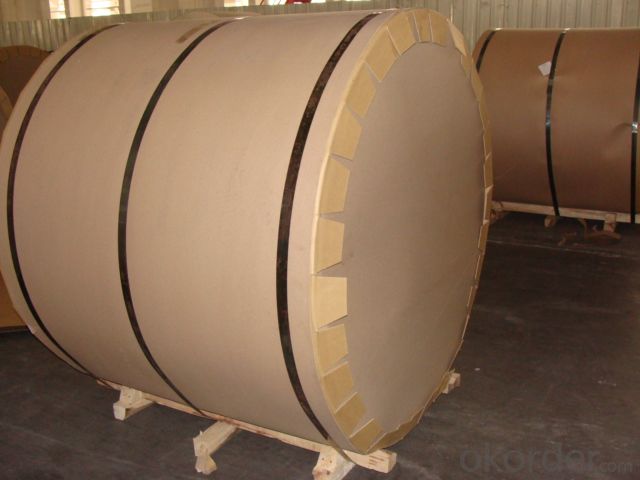
4.C.C AA1060 Aluminum Coils used as Building Material Specification
Alloy | AA1060 |
Temper | H14, H16, H18, H22, H24, H26, H32, O/F |
Thickness | 0.2mm -- 100mm |
Width | 30mm -- 1700mm |
Standard | GB/T 3880-2006,EN |
5. FAQ of C.C AA1060 Aluminum Coils used as Building Material
A.How to guarantee the quality?
Customers are welcome to our mill to visit and check the products. Besides, we can arrange a third party to test C.C AA1060 Aluminum Coils used as BUiding Material.
B.When will you deliver the products?
C.C AA1060 Aluminum Coils used as BUiding Material will be delivered within 35 days after receiving advanced payment or original L/C.
- Q: How do aluminum coils contribute to reduced material waste?
- There are several ways in which aluminum coils contribute to the reduction of material waste. Firstly, aluminum is a material that can be recycled multiple times without losing its properties. This recyclability feature alone helps to reduce material waste as it eliminates the need for extracting and producing new aluminum. Moreover, industries that require precision and efficiency, such as automobile manufacturing, HVAC systems, and electrical equipment, often utilize aluminum coils. These coils can be easily tailored to meet specific requirements, minimizing the use of excess material and reducing waste. Furthermore, aluminum coils have a high strength-to-weight ratio, meaning they can be manufactured using less material while still maintaining the desired strength and durability. This lightweight characteristic not only reduces material waste but also allows for more efficient transportation and installation processes, resulting in lower fuel consumption and less environmental impact. In addition, aluminum coils can be designed to have a longer lifespan and improved resistance to corrosion. This durability factor helps to minimize the need for frequent replacement, thereby reducing material waste over time. Furthermore, the long lifespan of aluminum coils makes them an appealing choice for sustainable construction practices, further contributing to waste reduction in the long term. Overall, the utilization of aluminum coils in various industries not only promotes recycling and reusability but also enables efficient customization, lightweight construction, enhanced durability, and extended lifespan. These factors collectively contribute to the reduction of material waste, making aluminum coils an environmentally-friendly option.
- Q: Related technical standards of aluminium coil
- GB/T 1196-2002 remelting aluminium ingotTechnical specification for dustproof and anti gas of GB/T 17397-1998 aluminium electrolysis productionFixed capacitors for use in GB/T 17208-1998 electronic equipment - Part eighteenth: Blank detail specification - non solid electrolyte sheet type aluminium fixed capacitor level E
- Q: Is it possible to use aluminum coils as a material for crafting jewelry?
- <p>Yes, aluminum coils can be used to make jewelry. Aluminum is a lightweight, durable, and affordable metal that is often used in costume jewelry and art pieces. It's easy to work with, allowing for intricate designs and shapes. However, it's important to note that aluminum is not as valuable or as resistant to tarnishing as precious metals like gold or silver, so it may not be suitable for high-end or long-lasting jewelry pieces.</p>
- Q: Can aluminum coils be used in agricultural applications?
- Yes, aluminum coils can be used in agricultural applications. Aluminum is a versatile and durable material that can withstand various environmental conditions, making it suitable for agricultural equipment such as irrigation systems, greenhouse structures, and ventilation systems. Additionally, aluminum's light weight and corrosion-resistant properties make it an ideal choice for agricultural applications where durability and long-term performance are essential.
- Q: What are the different yield strengths of aluminum coils?
- The yield strength of aluminum coils can vary depending on the grade or alloy of aluminum used. Aluminum is available in various grades, such as 1100, 3003, 5052, and 6061, among others. Each grade has its own unique properties, including different yield strengths. For instance, the 1100 grade of aluminum has a relatively low yield strength of about 12,000 psi (pounds per square inch). This grade is often used for general-purpose applications where high strength is not a primary requirement. On the other hand, the 6061 grade of aluminum has a significantly higher yield strength of around 35,000 psi. This grade is commonly used in structural applications or where higher strength and durability are needed. It's important to note that the yield strength of aluminum coils can also be influenced by factors such as the thickness and temper of the material. Thicker coils generally have higher yield strengths, while different tempering processes can further enhance the strength and other mechanical properties of the aluminum. In summary, the yield strength of aluminum coils can vary depending on the grade, thickness, and temper of the material. It is essential to consider these factors when choosing the appropriate aluminum coil for specific applications to ensure optimal performance and structural integrity.
- Q: How do aluminum coils compare to titanium coils in terms of weight?
- In terms of weight, aluminum coils are considerably lighter than titanium coils. This is due to aluminum having a lower density than titanium, resulting in aluminum weighing less than titanium for the same volume. This quality makes aluminum coils highly favored in industries like aerospace and automotive where reducing weight is essential. On the other hand, titanium coils are renowned for their exceptional strength and excellent corrosion resistance, making them ideal for environments that prioritize durability. Ultimately, the decision between aluminum and titanium coils depends on the specific needs and compromises sought for a particular application.
- Q: How do aluminum coils contribute to sustainable transportation systems?
- Aluminum coils play a significant role in promoting sustainable transportation systems in several ways. Firstly, aluminum is a lightweight material that helps reduce the overall weight of vehicles, resulting in improved fuel efficiency and reduced carbon emissions. The use of aluminum coils in vehicle manufacturing can contribute to enhancing the fuel economy of automobiles, which is crucial for sustainable transportation. Moreover, aluminum is a highly recyclable material, with nearly 75% of all aluminum ever produced still in use today. This recyclability factor makes aluminum coils a sustainable choice as they can be easily recycled and reused without compromising their quality. By incorporating recycled aluminum coils into vehicle production, manufacturers can reduce energy consumption and greenhouse gas emissions associated with primary aluminum production. Additionally, aluminum is highly resistant to corrosion, making it a durable material for various automotive applications. The longevity of aluminum coils ensures that vehicles require less maintenance and replacement parts, reducing waste and contributing to sustainable transportation systems. Furthermore, the use of aluminum coils in electric vehicles (EVs) is particularly advantageous. EVs require lightweight components to maximize battery efficiency and increase the driving range. Aluminum coils fulfill this requirement by providing the necessary lightweight construction without compromising safety or performance. By enabling the production of lightweight EVs, aluminum coils contribute to the wider adoption of electric vehicles, which have a significantly lower carbon footprint compared to traditional internal combustion engine vehicles. In summary, aluminum coils contribute to sustainable transportation systems by reducing vehicle weight, improving fuel efficiency, and reducing carbon emissions. Their recyclability, durability, and compatibility with electric vehicles further enhance their sustainability credentials. Incorporating aluminum coils in vehicle manufacturing is a step towards achieving a greener and more sustainable transportation future.
- Q: How do aluminum coils contribute to thermal insulation?
- Thermal insulation is enhanced by aluminum coils in multiple ways. Firstly, aluminum possesses a remarkable reflective property, enabling it to deflect heat and radiation away from the surface. This characteristic effectively reduces the amount of heat absorbed by the coil and transmitted to the surroundings. Additionally, aluminum coils are frequently employed in conjunction with insulation materials like foam or fiberglass. These insulating materials create air pockets that serve as a barrier against heat transfer. The aluminum coil acts as a safeguard, shielding the insulation material from any potential harm or compromise. Moreover, aluminum is a lightweight material that exhibits exceptional resistance to corrosion. This feature allows for the versatile use of aluminum coils in various applications, including HVAC systems, where they contribute to maintaining a consistent temperature by minimizing heat loss or gain. In summary, aluminum coils assume a critical role in thermal insulation by deflecting heat, safeguarding insulation materials, and imparting durability and longevity to the insulation system.
- Q: Why does fillet appear when rolling aluminum coil?
- How thick and wide is it when there is such problem? Which is the rolling pass? And what is the type of the rolling mill? The simple 4 rollers or CVC and HC rolling mill with roller control. Does the filler appear in rolling or out of roller? Different thickness will lead to different analysis.
- Q: This question asks about the impact of aluminum coils on food quality, considering possible effects on taste, safety, and preservation.
- <p>Aluminum coils, when used in cooking or food packaging, can potentially affect the quality of food. If aluminum leaches into the food, it may alter the taste and could pose health risks due to aluminum's neurotoxic properties. However, modern food-grade aluminum coils are coated or anodized to prevent such leaching, ensuring food safety. They are also used in heat transfer for cooking, which can improve the efficiency and evenness of cooking, thus enhancing food quality. It's crucial to use high-quality, food-safe aluminum coils to avoid any negative impact on food quality and safety.</p>
Send your message to us
Roll of Aluminum Coil - C.C AA1060 Aluminum Coils for Building Material
- Loading Port:
- Shanghai
- Payment Terms:
- TT OR LC
- Min Order Qty:
- 3 m.t.
- Supply Capability:
- 10000 m.t./month
OKorder Service Pledge
OKorder Financial Service
Similar products
Hot products
Hot Searches
Related keywords
